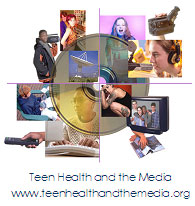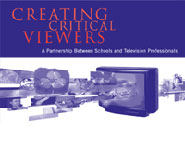
|
Welcome to the first edition of Media Literacy Northwest News, a quarterly newsletter of the NW Center for Excellence in Media Literacy. We are launching this newsletter as a vehicle to increase sharing of ideas and resources across Washington State, as well as the entire Northwest Region. We know that many of you are engaged in some very exciting media literacy education projects! However, too often those who are involved with this work are not aware of the many others throughout this region who share our interests. One of our hopes is that through this newsletter we will promote and facilitate communication among a strong media education network of groups, organizations and individuals across the Northwest. We would like very much to use this newsletter to showcase some of your projects. Please feel free to send us pictures and any project detail that you would like to share. There are also media education events and activities taking place throughout the year that would be of particular interest to those in the media literacy community. Whenever possible within our quarterly format, we'll let you know about these events. If you have an event or activity that you would like to publicize, please contact us. Some of you may have recently discovered a new resource material that you think others would also find helpful. A newsletter can provide a means for us to initiate this type of sharing and information exchange. We hope this newsletter will become a vehicle for sharing project ideas, new resource materials, as well as all the latest happenings in media literacy. We welcome your ideas, comments, and suggestions. Please feel free to contact me at macohen@u.washington.edu. As we enter this New Year, media literacy has never seemed more important! We wish you success in all your endeavors to move media literacy forward in your own communities. Remember that you are not alone and that there are many of us all across this region that share your vision of a media literate America. Together we can make a difference! All the best,
|
|
|
Much of the Center’s work is focused on media literacy as it relates to health issues. Among the issues that the Center addresses are: teen pregnancy and STIs, tobacco, alcohol and use of other substances, youth violence, and obesity, body image and nutrition. For more information about the Center’s work around issues of teen health, visit www.teenhealthandthemedia.org. The Center was launched after a media literacy needs assessment was conducted across Washington State. The assessment proved very useful in offering guidance regarding the functions that a new Center for Media Literacy could be expected to provide in the state. The next step involved the selection of pilot sites from around Washington. These sites would be the first to receive technical assistance and resources from the newly established Center in its effort to promote and support media literacy based activities at the grassroots community level. Four sites that had demonstrated strong previous interest in media literacy were selected. These sites were: Seattle, Spokane County, Kitsap County, and Southwest Washington. Advisory boards at each of these sites have been working with Center staff over the past three years to promote and support media literacy based activities in their respective communities. |
|
Many exciting developments have taken place at each of the pilot sites. Among the most recent developments are: |
 |
The Northwest Alliance for Responsible Media (NW-ARM)
now has an office in the Schoenberg Center on the Gonzaga University
campus where their organization has been officially recognized as a
collaboration between Gonzaga University and University of Washington.
Among their many activities for 2005, NW-ARM will be offering
opportunity grants for media literacy based community projects and
student research projects.
|
 |
The Southwest Washington Media Literacy Partnership’s
executive board is following up the teen media production workshops it
offered across the region in 2004 by now giving community members the
chance to apply for opportunity funds and design their own media
literacy-based projects.
|
 |
Kitsap County’s group plans to continue the
work it began last year on a video-based media literacy/childhood
obesity prevention project. Thanks to the development and production
efforts of Kitsap County Health Department, Kitsap County Housing
Authority and independent film maker Craig Leslie, the group has now
produced the video Eat, Think and Be Healthy. This year it plans to
develop supplementary curriculum material for its new video and then
offer training for community members using this new video based package.
|
 |
The Seattle Alliance for Media Education (SAME),
a young adult group, continues to meet regularly. This group engages
in a wide range of activities. They have media nights for other young
adults to discuss media literacy topics; they table at media-related
conferences and have served on panels and offered presentations
regarding media literacy.
|
|
The NW Center has been working over the past 3 years to identify higher education faculty who share a commitment to the area of media literacy education. The Center held its first videoconference to link interested faculty in September of 2002. At that time, 7 faculty participated representing University of Washington, Washington State University and Gonzaga University, and Pacific Lutheran University. For our most recent videoconference held December, 2004, 25 faculty from across Washington were identified who expressed a strong interest in participating in a media literacy group. Those 12 individuals who were able to attend the conference represented Antioch University Seattle, Evergreen State College, Tacoma, Gonzaga University, Pacific Lutheran University, Seattle University, University of Washington, Washington State University Pullman and Tricities campuses, and Western Washington University. If you would like to learn more about this group or would like to participate, please contact Marilyn Cohen, Center Director at macohen@u.washington.edu or call (206) 543-9414. |
|
The NW Center for Excellence is very happy to announce that it is able to make two complete media literacy curricula available on its website:
The Center is pleased to present its newest web site.
|
||||||||||||
|
There are so many great resources out there about media literacy! Here is one that we highly recommend:
|
|
Teens, Tobacco & Media and Beyond: Media Literacy Institute
This institute is for health professionals, teachers, prevention specialists and other adults who work with teens. Institute highlights include a demonstration training for teen presenters ongoing throughout the day, media literacy 201 for those familiar with media literacy basics, and separate program tracks for experienced Teens, Tobacco & Media coaches and for those new to the program.
The one-day institutes will be conducted at three different sites:
Seattle, March 18, 2005, University Heights Center Yakima, March 24, 2005, ESD 105 For more information and/or to register, visit our website at www.teenhealthandthemedia.org or call us toll-free @ 1-888-833-6638.
National Media Education Conference 2005
The conference, Giving Voice to a Diverse Nation, will take place June 25-28, 2005 in San Francisco. Sign up for the conference by going to www.amlainfo.org
Do you have something that you would like us to add in our next newsletter? If so, send us an email at macohen@u.washington.edu. We would love to hear from you. NW Center for Excellence in Media Literacy
(206) 543-9414
Check our websites for regular updates, news, and information! www.nwmedialiteracy.org
|
|






